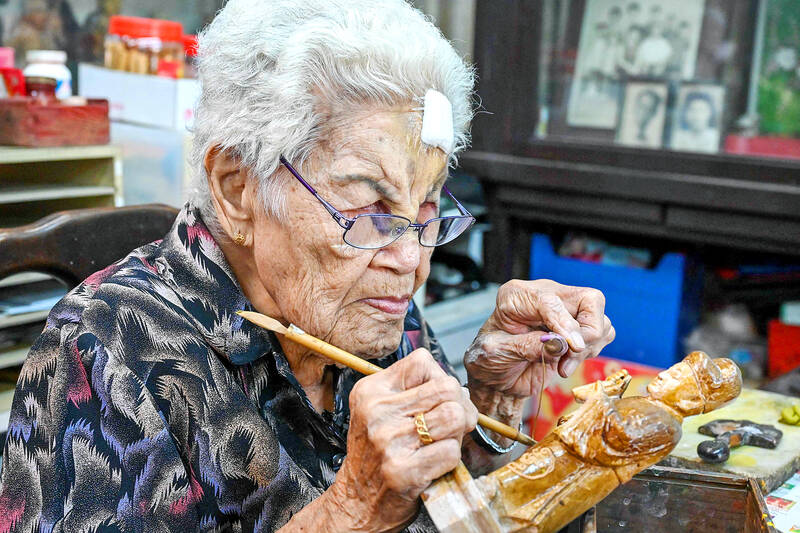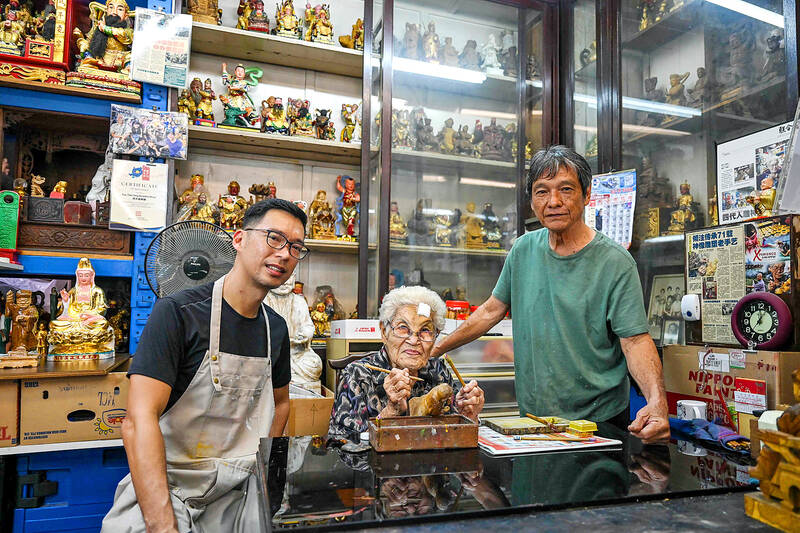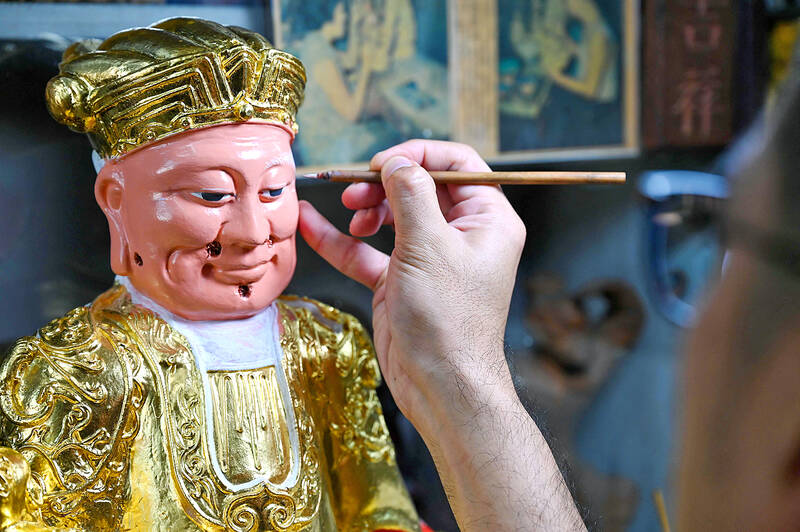Tan Chwee Lian picks up a small paddle, her finger resting on a groove worn into the wood over 70 years of making Buddhist and Taoist deities in her shop, one of the last of its kind in Singapore.
Facing competition from mass-produced items and lacking heirs to take up the trade, the traditional craft is in danger of dying out.
Tan’s more-than-a-century-old shop in downtown Singapore, tucked between hip cafes and boutiques, is one of the city-state’s last effigy establishments still making the wooden statues by hand.

Photo: AFP
The 92-year-old great-grandmother has been making the wooden statues since her arranged marriage to effigy craftsman Ng Tian Sang at the age of 18.
“I sat beside (my husband) and watched... when he left to buy things or run errands I would take over, then he would come back and tell me what I did wrong,” Tan said while using the wooden paddle to roll out a piece of dough made of joss stick ash using a secret family recipe.
She rolled out the mixture until it was a thin thread, then used two bamboo sticks to attach it to a wooden statue in an intricate pattern to demonstrate thread sculpture, a traditional carving technique from southeastern China. Although she is now retired from crafting, she comes to the Say Tian Hng Buddha Shop daily, helping out with odd tasks from her desk at the front of the traditional shophouse stacked with hundreds of gods looking out from the shelves.

Photo: AFP
Her son, 71-year-old Ng Yeow Hua, runs the shop, making, selling and repairing Taoist and Buddhist idols for temples and devotees.
Like many Singaporeans, the family’s origins can be traced back to China, from where many people emigrated in the 19th and early 20th centuries in search of a better life.
Ng’s grandfather founded the shop along with his brother in 1896, after moving to Singapore from Kinmen, an island in modern-day Taiwan.

Photo: AFP
Ng’s son, Ng Tze Yong, is now reinventing the business by running tours of the workshop as well as educational programs on Chinese culture.
Ng hopes the art can be passed down through the generations.
“If (my son) has the interest he can continue, but don’t force it,” he said.
To ensure that the art continues, the 43-year-old former journalist decided to become an apprentice several years ago. He now works in the shop one day a week, in addition to his day job at a local charity.
‘BEAUTY OF IMPERFECTION’
Handmade effigies take up to three months to make by artisans who must pick up the skills over years of informal learning and are entrusted with trade secrets passed down over generations. In comparison, machine-made statues are mass-produced, cost a fraction of the price and can be delivered quickly. “The customers that come to us believe in the beauty of imperfection, of things made by hand... in the authenticity of something that is made to worship divinity,” the younger Ng said.
“But yes, it has caused a decline in the business,” he admitted. “I’m trying to learn the craft from my dad and my grandma before it’s too late.”
In addition to learning decorative techniques, he must familiarize himself with scores of Taoist deities, each with a unique story.
“In Taoism (there) is this idea that you don’t have to be perfect. None of these gods are perfect,” he said.
For example, legend has it that the monkey god rebelled against heaven but redeemed himself after protecting a monk on a journey to procure holy texts from India. He is sometimes depicted with golden eyes believed to be able to spot evil. For the family, the pieces play an important role in the lives of their customers when they are going through rough patches.
“Throughout that time, these effigies were the ones that gave them the hope and encouragement to move on... so we take that very seriously,” Ng said.
He is recording all of his family’s knowledge and eventually hopes to take on other apprentices to ensure the shop can keep operating beyond his generation.
“The fact is that if (I) don’t do anything, the shop dies.”

Jacques Poissant’s suffering stopped the day he asked his daughter if it would be “cowardly to ask to be helped to die.” The retired Canadian insurance adviser was 93, and “was wasting away” after a long battle with prostate cancer. “He no longer had any zest for life,” Josee Poissant said. Last year her mother made the same choice at 96 when she realized she would not be getting out of hospital. She died surrounded by her children and their partners listening to the music she loved. “She was at peace. She sang until she went to sleep.” Josee Poissant remembers it as a beautiful

Before the last section of the round-the-island railway was electrified, one old blue train still chugged back and forth between Pingtung County’s Fangliao (枋寮) and Taitung (台東) stations once a day. It was so slow, was so hot (it had no air conditioning) and covered such a short distance, that the low fare still failed to attract many riders. This relic of the past was finally retired when the South Link Line was fully electrified on Dec. 23, 2020. A wave of nostalgia surrounded the termination of the Ordinary Train service, as these train carriages had been in use for decades

Lori Sepich smoked for years and sometimes skipped taking her blood pressure medicine. But she never thought she’d have a heart attack. The possibility “just wasn’t registering with me,” said the 64-year-old from Memphis, Tennessee, who suffered two of them 13 years apart. She’s far from alone. More than 60 million women in the US live with cardiovascular disease, which includes heart disease as well as stroke, heart failure and atrial fibrillation. And despite the myth that heart attacks mostly strike men, women are vulnerable too. Overall in the US, 1 in 5 women dies of cardiovascular disease each year, 37,000 of them

March 2 to March 8 Gunfire rang out along the shore of the frontline island of Lieyu (烈嶼) on a foggy afternoon on March 7, 1987. By the time it was over, about 20 unarmed Vietnamese refugees — men, women, elderly and children — were dead. They were hastily buried, followed by decades of silence. Months later, opposition politicians and journalists tried to uncover what had happened, but conflicting accounts only deepened the confusion. One version suggested that government troops had mistakenly killed their own operatives attempting to return home from Vietnam. The military maintained that the